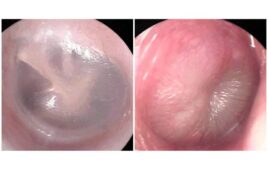
A chest X-ray showing a tumor in the lung. [Image from Wikipedia]
“These results reveal an opportunity to detect lung cancer from a simple blood draw,” said Kevin Conroy, chairman and CEO of Exact Sciences, in a news release. “Our collaboration with Mayo Clinic is efficiently identifying biomarkers for additional cancer applications on the same technology platform as Cologuard.”
Exact Sciences (Madison, Wis.) currently offers a non-invasive colon cancer screening called the Cologuard. It is used for the qualitative detection of colorectal neoplasia associated DNA markers and also detects the presence of occult hemoglobin in human stool, according to the Cologuard patient brochure. Colon cancer affects every 41 people out of 100,000 in the U.S. but has seen a decline in new cases over the last 20 years, according to the National Cancer Institute. Still, there could be a growing need for better screening because of the mysterious rise in colon and rectal cancer rates among young people.
Lung cancer, on the other hand, is the most common cancer globally, affecting 1.8 million people worldwide. Approximately 415,000 Americans who are living today have been diagnosed with lung cancer in their lifetime, according to the American Lung Association.
The 5-year survival rate for lung cancer patients is 17.7%; colon, breast and prostate cancer survival rates are 64.4%, 89.7% and 98.9% respectively. If half of the people who are at a high risk of developing lung cancer got regular treatments, 13,000 lung cancer deaths could be prevented annually.
The blood test developed by Exact Sciences was tested on a group of 398 patients. Of those patients, 311 were controls and the remaining 87 had cancer. The study showed that the biomarkers in plasma were highly accurate for determining if a patient had any type at any stage of lung cancer. Four novel methylated DNA markers had a sensitivity of 91-96% at a specificity of 90-94%.
“More studies are needed to corroborate accuracy, however, this plasma DNA test approach appears to be a promising new method and may serve as a rational follow-up to the common findings of lung nodules on CT scanning and may have application in screening for lung cancer,” said David E. Midthun, M.D., a pulmonologist at the Mayo Clinic.
Currently, CT scans are used to screen for lung cancer. Approximately 8.6 million Americans are considered at high risk for developing lung cancer and if they receive regular CT scans, it could reduce the mortality of lung cancer by almost 20%.
“A blood-based test may help guide next steps after a scan reveals an indeterminate nodule,” said Conroy. “For example, a positive blood test might suggest the need for a biopsy or surgery. In contrast, a negative test might suggest a less aggressive approach. Such a test could offer the opportunity to significantly improve health outcomes and reduce the financial impact on the health care system.”
Life science company Prevencio and the Massachusetts General Hospital also recently collaborated to produce a blood test that could detect heart disease within 2 hours and obstructions in arteries of 70% or more.
An abstract of the study was published online by the American Association for Cancer Research and will be presented on April 2 at the Walter E. Washington Convention Center in Washington, D.C. from 1 p.m. to 5 p.m.
[Want to stay more on top of MDO content? Subscribe to our weekly e-newsletter.]




